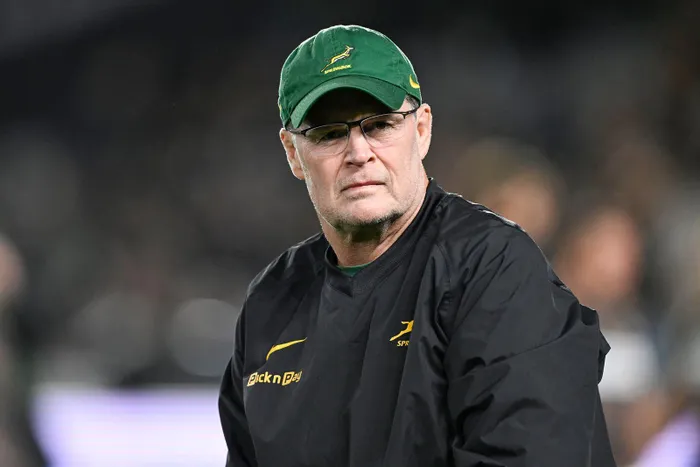Springboks warned: Remember Brighton, but don’t relive it against Japan

The Springboks embark on a five-week European tour starting with Japan at Wembley on Saturday, November 1, followed by Tests against France, Italy, Ireland, and Wales. Coach Rassie Erasmus is optimistic but warns of tough conditions and strong opposition, highlighting the squad’s experience and focus as key to securing results.
Image: Backpagepix
Rassie Erasmus has urged the Springboks to stay focused on the present when they face Japan at Wembley on Saturday — without forgetting the lessons of Brighton around 10 years ago.
The upcoming clash inevitably revives memories of Japan’s 34-32 victory over South Africa at the 2015 Rugby World Cup, one of the sport’s greatest shocks, and Erasmus acknowledged the impact of that match but was quick to steer attention to the here and now.
He said he distinctly remembers that day — watching the game from home — and called the 2015 result “one of their iconic wins.” But while acknowledging its place in rugby history, Erasmus made it clear that the current world champion Springbok side operates in a different era.
“Our focus is on what lies ahead, not what happened a decade ago,” he said. “You learn from the past, but you don’t live in it.”
Erasmus added that his staff’s preparation centres on Japan’s current form and the progress they’ve made under coach Eddie Jones. “They will come with speed, structure and confidence,” he said. “We respect what they did before, but we’re focused on what’s coming.”
De Allende ready for reunion with Japanese teammates
For centre Damian de Allende, Saturday’s fixture carries added significance. The veteran midfielder, who plays for the Panasonic Wild Knights in Japan, will line up against several familiar faces.
“We know Japan will play with pace,” he said. “They’ve got a very organised attack and thrive on quick transitions. Our challenge is to stay composed and play on our terms.”
De Allende said composure and accuracy will be key as the Boks prepare for Japan’s fast, disciplined approach. “It’s always special to go up against familiar faces,” he said. “I know how skilful and disciplined they are, so we’ll need to be sharp.”
The two-time world champion praised the standard of rugby in Japan, saying it deserves more credit. “People underestimate how tough the Japanese league is,” he said. “It’s fast, physical and incredibly demanding every week.”
He added that Japan’s strength lies in their game intelligence as well as tempo. “They’re not just playing with speed,” he said. “They’re tactically very smart and know how to turn momentum. We’ll have to be disciplined and patient.”
De Allende believes the Springboks must impose their rhythm rather than reacting to Japan’s. “We can’t get caught in their tempo,” he said. “We have to stick to our plan and execute.”
Erasmus clarifies De Klerk omission
Meanwhile, Erasmus also addressed the continued absence of scrumhalf Faf de Klerk from the current Springbok touring squad. The 33-year-old, capped 60 times, has slipped down the pecking order amid fitness and form concerns.
De Klerk featured in only three Tests last year and has been used as a substitute just twice this season, against Georgia and Italy. He now finds himself behind Cobus Reinach, Grant Williams and Morne van den Berg in the selection pecking order.
Erasmus confirmed that De Klerk remains part of the national plans, but that the decision was made to give him regular game time in Japan rather than having him sit out the tour. “Faf is definitely part of our plans,” he said. “We just felt that it would be better for him to get regular minutes at his club rather than sitting out during this window.”
He explained that Japanese-based players who have not played regularly for South Africa risk losing match sharpness between Test windows. “In previous tours, we’ve started slowly against teams like France and Ireland because some players from Japan hadn’t had much rugby,” Erasmus said. The decision on De Klerk was made to “fix that.”
De Klerk’s club, Canon, has four warm-up fixtures scheduled this month, and Erasmus expects that consistent game time to be of long-term benefit for De Klerk.